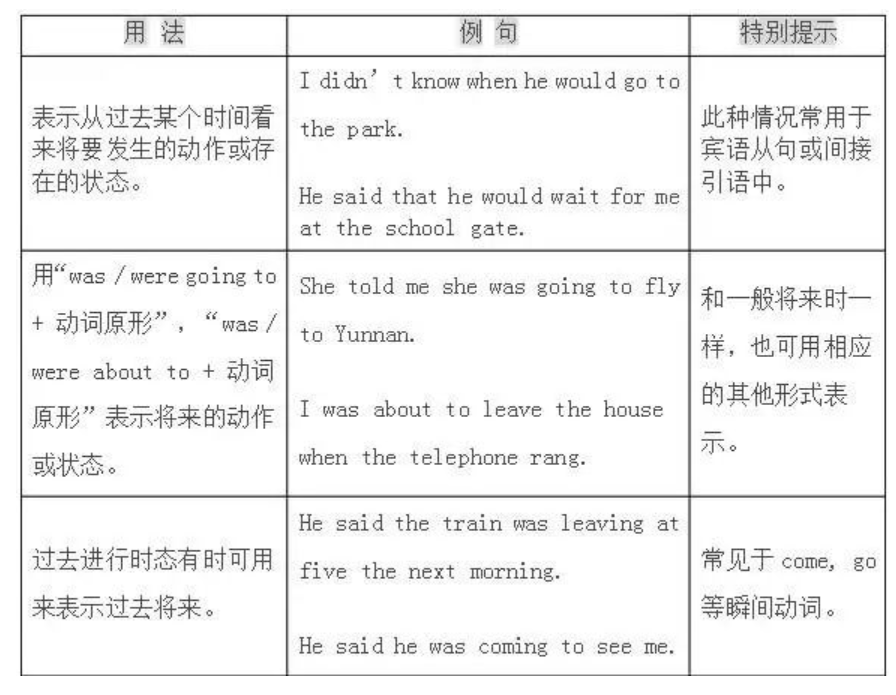来源:网络资源 2023-08-16 16:36:17
时态详解
一、定义
过去将来时常用于宾语从句或间接引语中。
过去将来时常用“would +动词原形”或“was / were going to +动词原形”来表达。

过去将来时的基本特征,也就是我们今天所谈到的“立足过去,着眼未来”。它表示从过去某一时间来看将要发生的某个动作或存在的某种状态。
例如:Mary told me that she would go to Shanghai by plane.
玛丽告诉我说她将要坐飞机去上海。
二、用法
1.表示从过去某个时间看来将要发生的动作或存在的状态。
I didn’t know when he would go to the park.
He said that he would wait for me at the school gate.
此种情况常用于宾语从句或间接引语中。用“was / were going to +动词原形”,“was / were about to +动词原形”表示将来的动作或状态。
She told me she was going to fly to Yunnan.
I was about to leave the house when the telephone rang.
和一般将来时一样,也可用相应的其他形式表示。
2.过去进行时态有时可用来表示过去将来。
He said the train was leaving atfive the next morning.
He said he was coming to see me.
常见于come, go等瞬间动词。
(1)基本构成:
A ) would +动词原形
如:He asked me if I would stay here.
他问我是否要待在这儿。
B ) was / were going to +动词原形
如:No one knew when he was going to finish his homework.
没有人知道他什么时候会完成作业。
C ) was/ were ( about ) to +动词原形
如:He said that they were to leave at six.
他说他们将于6点动身。
She said that the meeting was about to begin.
她说会议就要开始了
D) come, go, arrive, leave, die等瞬时动词,用在过去进行时态中表示过去将来。
如:She told us that she was leaving for Yunnan.
她告诉我们她将要去云南。
(2)基本用法:
A )主句为过去时,宾语从句常表示将要发生的事情。
如:Nobody knew what would happen after a hundred years.
没有人知道一百年之后将会发生什么事。
We wanted to know whether she was going to speak at the meeting.
我们想知道她是否准备在会上发言。
B )在叙述过去的事情或事情发生的经过时,用过去将来时表示在当时看将来会发生的事。
如:It was a Sunday afternoon. A young woman named Maria had just left school.
一个星期天的下午,一位名叫玛丽亚的年轻人刚离开学校。
He was going to start to work the next week, so she decided to buy some new clothes and a new pair of shoes.
因为她准备下周开始工作,所以,决定买些新衣服和一双新鞋子。
C )过去将来时还可以用来表示非真实的动作或状态。
如:If I had a chance to study abroad, I would study at Harvard University.
如果我有机会出国学习的话,我就会去哈佛大学。
I wish he would go with me to the cinema tonight.
今晚他能和我一起去看电影就好了。
编辑推荐:

欢迎使用手机、平板等移动设备访问中考网,2023中考一路陪伴同行!>>点击查看